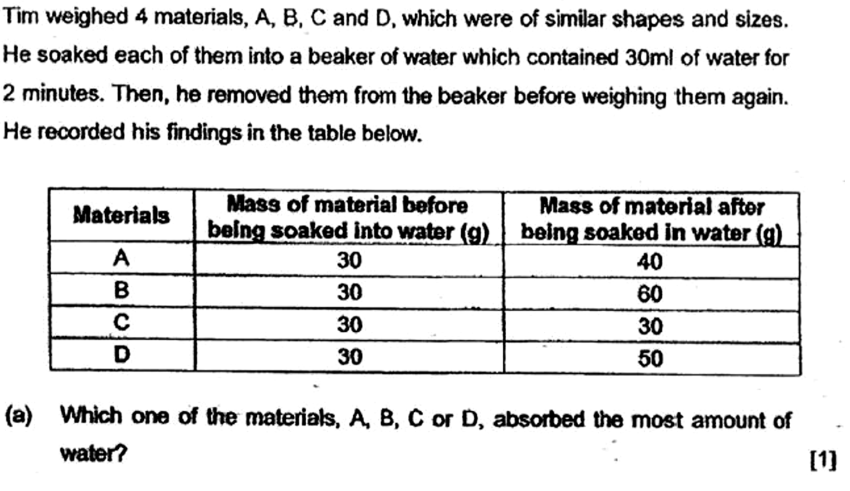Materials: Most Common Open-Ended Questions in Science Exam Papers
- Ottodot Singapore

- May 16, 2024
- 3 min read
Updated: Jun 10, 2024
3 types of Open-Ended Questions
Stating Questions
Comparison Questions
Explanation Questions
Open-ended questions (OEQs) in science exams can be challenging, particularly when dealing with complex topics like materials. But fear not! By familiarizing yourself with the common types of OEQs and employing some smart strategies, you can handle them like a pro. Here’s a breakdown:
Type # 1 - Stating Questions
This type of questions requires students to recall and state key Science concepts.
You must:
Recall the correct Science concept
Use Science keywords
How can you identify such questions?
Look out for questions that use
terms like 'state', 'list', 'describe', 'which', 'suggest' and
phrases like 'state two ways/another way'
Thinking process
Ask yourself:
What is the concept involved here?
What keywords do I need to use?
Question 1
Thinking process
What is the concept involved here?
______________________________________________________________________
Answer
______________________________________________________________________
Question 2
Thinking process
What is the concept involved here?
______________________________________________________________________
Answer
______________________________________________________________________
Type # 2 - Comparison Questions
This type of questions requires students to contrast two different setups or
observations.
You must:
Structure answers to show the comparison between two setups or observations
E.g. ‘... less than/more than ...’ or ‘... is stronger than/weaker than...’
How can you identify such questions?
Look out for questions that use
Terms like 'than', 'compare' and
Phrases like 'what is the difference between ...'
Thinking process
Ask yourself:
What are you comparing here?
How are they different?
What is the concept that can explain this difference?
Question 1
Thinking process
What are you comparing here?
______________________________________________________________________
How are they different?
______________________________________________________________________
What is the concept that can explain this difference?
______________________________________________________________________
Answer
______________________________________________________________________
Question 2
Thinking process
What are you comparing here?
______________________________________________________________________
How are they different?
______________________________________________________________________
What is the concept that can explain this difference?
______________________________________________________________________
Answer
______________________________________________________________________
Question 3
Thinking process
What are you comparing here?
______________________________________________________________________
How are they different?
______________________________________________________________________
What is the concept that can explain this difference?
______________________________________________________________________
Answer
______________________________________________________________________
Type # 3 - Prediction Questions
This type of questions requires students to elaborate on the observation and explain using a Science concept.
You must:
Elaborate on the observation
Explain why it happens using a science concept
Use the right Science keywords
How can you identify such questions?
Look out for questions that use phrases like 'explain why', 'explain her observation',
'why do you think ...' or 'give a reason'
Thinking process
Ask yourself:
What do you observe in this question?
Why do you think this happens?
What are the science keywords that you should use?
Question 1
Thinking process
What would you observe based on the question?
______________________________________________________________________
What is a science concept that explains your answer?
______________________________________________________________________
What are the keywords that you should use?
______________________________________________________________________
Answer
______________________________________________________________________
Question 2
Thinking process
What would you observe based on the question?
______________________________________________________________________
What is a science concept that explains your answer?
______________________________________________________________________
What are the keywords that you should use?
______________________________________________________________________
Answer
______________________________________________________________________
Question 3
Answer: ______________________________________________________________________
Thinking process
What would you observe based on the question?
______________________________________________________________________
What is a science concept that explains your answer?
______________________________________________________________________
What are the keywords that you should use?
______________________________________________________________________
Answer
______________________________________________________________________
For open-ended questions in science exams, it is important that students approach them in a systematic manner. The ability to break down a complex question into steps and tackling them one by one would steer students towards mastery.
At Ottodot, we equip our students with the right techniques to master open-ended questions. We work with MOE teachers to build open-ended question games that scaffold the answering process and equip students.
Now, your child can reinforce their understanding of materials and other science topics through engaging and enjoyable activities, all from the comfort of home.
Message Us Or learn more about what we offer here.
















Comments